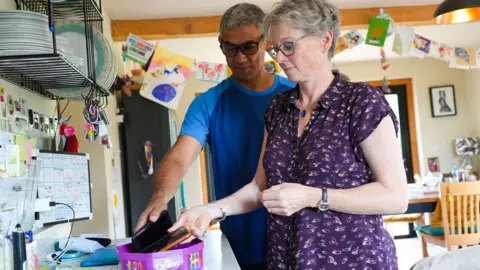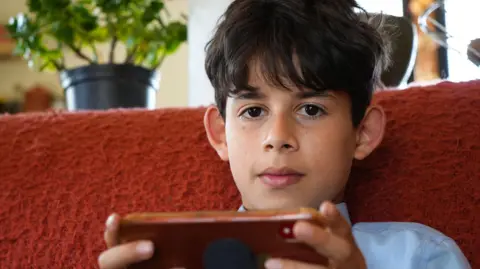Mother and father of 1000’s of kids have been requested to not give them a smartphone till they’re a minimum of 14 amid fears some have been utilizing units for eight hours a day.
Many faculties have already banned smartphones on website however one a part of the UK thinks it is going to be the primary to have a countywide coverage advising dad and mom in opposition to giving kids smartphones at dwelling.
Utilizing mobiles is already banned in faculties in Monmouthshire, south Wales, however as a consequence of an increase in cyber-bullying studies and fears cellphone use at house is affecting schoolwork, faculties are going a step additional.
“We have got studies of scholars who’re on-line at two, three, 4 within the morning,” stated Monmouth Complete headteacher Hugo Hutchinson.
“We get a variety of wellbeing points, as do all faculties, that come from social media exercise on-line over the weekend, or when they need to be asleep.”.
Mr Hutchinson stated faculties had labored on “strong” cellphone insurance policies however identified in the end kids’s time was largely spent outdoors of faculty, the place many nonetheless had unrestricted entry to smartphones.
Whereas academics in Monmouthshire acknowledge they cannot power dad and mom to not give smartphones to their under-14 kids, faculties have taken a “large step” to provide recommendation about what dad and mom ought to do in their very own dwelling.
Faculties in some areas of the UK have already requested dad and mom to not get their under-14s smartphones – like in St Albans, Belfast and Solihull in the West Midlands.
‘I used to be fearful my son would really feel omitted’
However Monmouthshire imagine they’re the primary county within the UK the place all secondary and first academics in each state and personal faculties are advising in opposition to smartphones for greater than 9,000 kids underneath the age of 14.
One of many dad and mom being suggested to not give their kids a smartphone is Emma who stated she felt like “the worst mother or father on the planet” after constantly telling her 12-year-old son Monty he wasn’t allowed one.
“He was feeling omitted,” she stated.

“He can be sitting on the college bus with out a cellphone and all people else can be doing the journey with a cellphone. He discovered that fairly tough. I feel for boys it is extra about video games on the cellphone.”
The mum-of-three is fearful what her son might be uncovered to on-line and the way “addictive” units have been however provided Monty a “brick cellphone” – a time period to explain older fashions that may’t hook up with the web and are solely able to calls and texts.
Because the considered giving Monty a smartphone when he reached secondary college had develop into one in all her “greatest fears”, she and different dad and mom stated they have been relieved faculties are taking possession.

Faculties hope the intervention of academics will assist these dad and mom that have been fearful saying no to a smartphone would imply their youngster was “omitted”.
However others argue their kids had been utilizing smartphones with none issues.
Nicholas Dorkings’ son, who’s shifting as much as secondary college in September, had his personal smartphone when he was eight.
“He is all the time kind of been on one,” he stated.

“It is like a relaxing factor, or [something to use] out of boredom. He is not on it that a lot, he is extra of a TV boy. He would not pull it out his pocket each 5 minutes, he can put it down and simply go away it.”
Nicholas stated he might perceive why faculties needed to get entangled, however he believed smartphones had develop into important to how younger folks talk.
Eleven-year-old Lili’s major college class is likely one of the first to be focused by the brand new coverage, after academics wrote to their dad and mom urging them to think about “brick telephones” – in the event that they felt their youngster wanted one thing for travelling to highschool.
‘Most children round right here have smartphones’
Lili stated she felt “14 to fifteen” was about the precise age for kids to get their first smartphone as by then they may stand a greater likelihood of understanding if one thing they learn on-line “wasn’t true”.
“We came upon that one in 4 kids have been cyber-bullied inside our faculty, which is de facto unusual,” stated the yr six pupil.

“It should not be proper, there should not be the prospect for folks to be cyber-bullied, as a result of we’re actually younger.”
Lili’s classmate Morgan stated she had obtained a smartphone however had determined to cease utilizing it after studying extra about them in class.
“Most children round right here have smartphones,” stated the 11-year-old.

“They’re simply 100% all the time on it. When children come over to play at some households they only go on their smartphones and simply textual content.”
“I used to go on it to simply scroll however I obtained bored – however then I might additionally get bored not being on my smartphone. I simply determined to cease scrolling to learn a e-book or the trampoline.”
Are cellphones being banned in UK faculties?
Faculties in Northern Eire are suggested to restrict pupils from utilizing telephones, in Scotland academics are backed to introduce phone bans whereas in Wales, headteachers have been instructed smartphones shouldn’t be banned “outright”.
In England, the youngsters’s commissioner has stated banning telephones ought to be a decision for head teachers however insisted dad and mom had “the true energy” to change how their kids used telephones with extra time spent on them outdoors of faculty.
So now each mother or father of all of Monmouthshire’s state and personal faculties can be instructed in regards to the county’s new smartphone over the approaching months.
‘Folks have an dependancy to smartphones’
“This isn’t a college problem. It is a complete group and society problem,” added Mr Hutchinson, whose complete college in Monmouth has 1,700 pupils.
“Like all faculties, we’re experiencing a lot greater ranges of psychological well being points in consequence. Dependancy to smartphones, dependancy to being on-line.
“We’ve got college students who on common are spending six, seven, eight hours a day on-line outdoors college. We have got studies of scholars who’re on-line at two, three, 4 within the morning.
“So the affect on their college day, the affect on their studying and the affect on their life possibilities is de facto elementary.”

In a token of solidarity to their son Monty and to encourage their two youthful daughters, Emma and her husband Kev provided to surrender their very own smartphones.
“We do 24 hours with out the cellphone, which has been fairly a difficult,” she stated.
“Generally we’d barely fail. However the first time I did it, though I used to be nervous, I felt like I might had a bit mini break.
“The youngsters adore it as properly, due to course they get to be those telling us to place our telephones down.”



